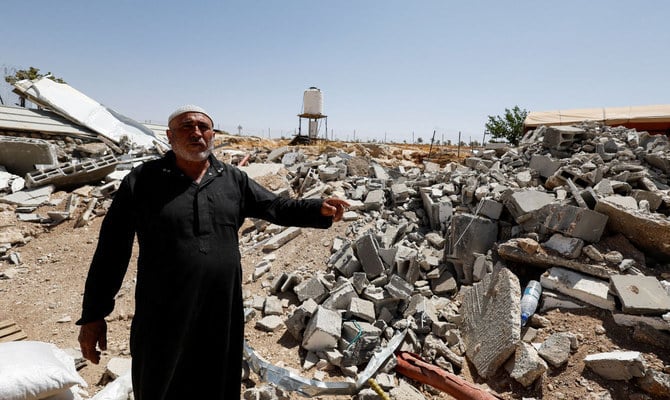RAMALLAH: The Palestinian Authority has protested against growing restrictions imposed on Palestinian development in Israeli-controlled parts of the West Bank, known as Area C — in addition to other limitations across the territory.
It called on the international community to intervene and stop the Israeli measures as they seriously threaten the two-state solution.
Area C, which Israel administers, covers over 60 percent of the West Bank.
The PA accused Israel of waging war targeting the area by demolishing homes, expanding settlements, confiscating land by various means and for different settlement and military purposes, and preventing Palestinians from reclaiming them and building homes there.
The protest came as a recent document claimed that the EU was strengthening its support for the Palestinian presence in Area C, which prompted an angry reaction from Israelis.
The Palestinians have voiced fears about the incoming right-wing Israeli government, headed by Prime Minister Benjamin Netanyahu, and Cabinet members Itamar Ben-Gvir and Bezalel Smotrich, moving to annex Area C to Israel — as Smotrich threatened several times.
Israel already has almost complete control over law enforcement, planning, and construction in Area C, and Israeli settlements and military training areas are concentrated within it.
An estimated 300,000 Palestinians live in Area C in 530 residential communities, of which 241 are located wholly or partly within it, one of the direct outcomes of the Israeli-Palestinian Interim Agreement on the West Bank and Gaza Strip (Oslo II) signed on Sept. 28, 1995.
The agreement provided for the temporary division of the West Bank as part of a transitional phase of five years, whereby Areas C falls under Israeli control.
The entire area, with the presence of the Israeli army, includes settlements, bypass roads, and border areas. At the same time, Area C was supposed to be transferred from Israeli control to Palestinian control, but this did not happen.
Ibrahim Melhem, the spokesman for the PA, told Arab News that Israel should not confiscate Palestinian lands for settlement purposes.
The PA does not recognize the Israeli administrative divisions of Palestinian lands, he pointed out, and added that the US, EU and the UN opposed the Israeli measures of confiscating and appropriating Palestinian lands in Area C, which undermined the two-state solution.
Melhem stressed that the PA adopted a strategy to enhance the steadfastness of the Palestinians in Area C by supporting farmers in various ways.
The Israeli authorities, however, destroy agricultural equipment that the Palestinian ministries provide to farmers in those areas, said Melhem.
“The Palestinian Ministry of Agriculture sends tractors, greenhouses, agricultural equipment, fertilizers, and water tanks to farmers in those areas, but the Israeli authorities come the next day and eradicate them, which hinders the development efforts of the Palestinian Authority,” Melhem told Arab News.
The PA spokesman did not hide his concern about stricter measures that might be taken by the next Netanyahu-led government.
Area C is rich in natural resources, including water sources and natural reserves, and contains most of the Palestinian agricultural lands and pastures.
In addition to the archaeological sites, all major Palestinian projects require work in Area C.
It includes about 385,900 Israeli settlers and about 300,000 Palestinians.
Israeli planning and zoning regulations in Area C prohibit Palestinian construction in about 70 percent of the area, and make it almost impossible to obtain permits in the remaining 30 percent.
Mustafa Barghouthi, secretary-general of the National Initiative Party, told Arab News that he was worried about the possibility that the next Israeli government will annex the remaining lands of the West Bank, eliminating the possibility of an independent Palestinian state.
He urged the PA to consider Area C in the West Bank as a “priority area” and to exert more efforts to strengthen the steadfastness of its residents.
Barghouthi, who also heads the Palestinian Medical Relief Committee active in Area C over the past two decades, added that “work in Area C is considered one of the forms of resistant development.”
He urged the EU to impose sanctions on Israel and cancel trade agreements with it in response to its destruction of projects funded by Brussels in Area C.
Shadi Othman, spokesman for the EU in the Palestinian Territories, told Arab News that the EU financed and implemented several projects and developmental and humanitarian aid in Area C, which, according to international law, is occupied Palestinian land.
The EU’s policy “is based on continuing to fund and implement these projects now and in the future,” he told Arab News.
He added the European support “continues, and we will work in Area C as part of the West Bank … and all EU countries agree on this position.”
Othman said that the European support provided to Palestinian projects in Area C during the last three years amounted to €30 million ($31.7 million).
The EU spokesman expressed concern over the Israeli army’s destruction of projects funded by the EU in Area C in the West Bank, and confirmed that the EU always discussed the matter with Israeli authorities.

